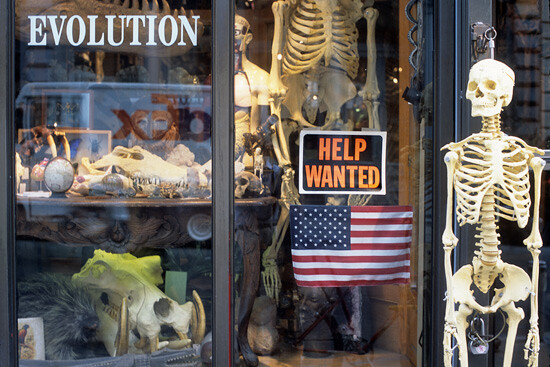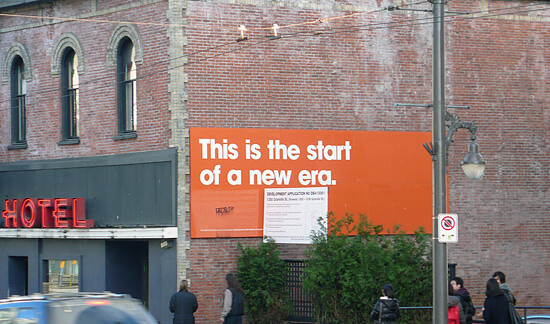If a reactionary is someone who answers the questions of the future with the mistakes of the past, then I gotta report there are a lot of reactionaries in the USA today. Here as in Europe, the specters of racism and xenophobia awoke to hail the new millennium, fueling a right-wing political dynamic that goes beyond each repressive law or police abuse. We like to blame these regressive trends on the wing-nuts, the Tea Partyers, the folks rotting their brains with Fox and CNN in the famous “red states”; but there’s nowhere to hide across the political fence. Returning to the status quo of the Clinton years is equally reactionary, as the Obama administration has proven with its damped-down wars and compromised economic policies. Meanwhile, hyper-leftist attempts to rouse the (extreme) left against the (extreme) right are another part of the problem: Glenn Beck in reverse. Marxist thinking—the tradition I hail from—does not have to stop in the 1930s, or in the 1960s. But that’s what it’s doing. We’re failing to perceive the present in the light of our possible futures.
Reactionaries of all stripes have not realized that the depression that started in 2007 will ultimately change the basic conditions of the neoliberal deal imposed by Thatcher and Reagan way back in the early 1980s. The crisis is likely to last a decade; but the solutions will define the next half-century of political and economic coexistence, just as the solutions to the stagflation of the 1970s launched us on the path of financial and information-driven globalization. If artists and intellectuals want to make a positive contribution to an extended process of change, first we have to analyze the current state of society and our own places in it. That can’t be done in a day and it won’t be done in this text either, because only a broadly shared inquiry can shift the outlook of entire social sectors. So I’d suggest that each of us begin as well as we can, with whatever local observations or theoretical concepts we can pull together, then share the debates as widely as possible until some collective conclusions emerge. The thing is to make a disagreeable question into an existential challenge and an opportunity to look forward for a change—an attitude that has long been missing in the USA.
There are at least three basic facts that explain the fear and political chaos in the United States today. The first is continuously rising inequality, which shows no sign of abating when you know that for the 38 largest American corporations, the depression year of 2009 was the most profitable ever for investors and executives, who together raked in some $145 billion.1 Once a country that gradually equalized opportunity with a social escalator called the public university, the US is now on its way to developing a caste system whose realities can no longer be hidden by the provision of infinite credit. Undocumented labor is encouraged by lax regulation so as to maintain profitability in construction, services, and the remains of manufacturing; meanwhile, millions of people who have seen their wages cut or their jobs delocalized are goaded by radio talk show hosts into blaming the immigrants for what the businessmen and politicians have done. For the kid who just wants to start gettin’ a life, a college degree at a total price of fifty to a hundred thousand dollars for four years is pretty hard to imagine when your parents are unemployed or behind on their mortgage (because you can’t get a loan under those conditions). Now it looks as though the depressed and semi-abandoned condition of the Midwestern cities all around my present home town of Chicago may be extended to the whole country—excepting, of course, financial nerve centers like the downtown Chicago Loop itself, home of the biggest derivatives market in the world, where the funny money keeps piling up higher and higher.


The second basic fact is a sudden expansion of the powers of the federal government, brought on not only by the financial bailout but also by the gigantic budgets of the anti-terrorist campaigns and the Bush/Obama wars. This is interpreted as socialism by the reactionary right, and it’s laid at the feet of the Obama administration; but it’s a consequence of American-led neoliberal globalization that has intensified exploitation, exclusion, and instability all across the world. 9/11 was the first case of blowback, but even more threatening is the situation in neighboring Mexico, flooded by American guns and caught in the grip of brutal drug cartels. Over the past fifteen years since the advent of NAFTA, Mexico’s agricultural economy has been destroyed by so-called free trade and increasing numbers of campesinos have been forced to choose between working in the dope fields, migrating to slums on the edge of the cities, or crossing the border themselves. This situation is directly maintained by the hypocrisy of the US governing consensus, which keeps drugs illegal and blames the countries that produce them for our own psychotropic appetites. But that’s just one example of the many forces driving the expansion of the homeland security apparatus; and it is ironic that the ecological crisis produced by overconsumption will soon be another, according to military projections.2
The third thing behind the rise of US national-populism is looming geopolitical decline, essentially by way of deflation and capital flight to China, plus a further threat to the global monetary order that currently funnels worldwide savings to the US Treasury. The catastrophe scenario of an international shift away from US Treasury bonds is unlikely; but a falling dollar and the inability to float new bond issues would be enough to change the superpower status of the US. The public feels the danger, the Tea Party screams against the debt, and the ruling class uses it to impose the kind of austerity plans once reserved for Africa and Latin America (not to mention retaining Bush-era tax cuts for the rich). But in the face of all that, no progressive discourses produce a view to more positive outcomes. Obama’s economic strategy is to let the dollar fall and stimulate US exports, reindustrializing the country. OK, despite all the dangers of currency wars and the dead-end of returning to Fordist mass-production models, that’s still a more positive scenario than endless government borrowing and predatory speculation on mountains of personal debt. Such a shift could lead to the production of ecological survival tools instead of the consumption trash on which everybody’s focused right now. But given the conditions described above, do we stand any chance of seeing this more positive scenario fulfilled in the immediate future?
In the infotainment department, I recommend the documentary Inside Job, on the roots of the financial meltdown. It reveals an economic and political class so deeply corrupt that it has reshaped the entire system of democratic governance in its own self-interested image. For years, I and many others have been telling this story of financially-driven globalization, but the film places you directly in front of dozens of key figures who incarnate its abstract principles at their highest degree of criminal excess and social dysfunction. The effect is devastating, and not only because you have to see that art-world foundation money and university endowments all circulate through this mega-casino. What I finally understood from the movie is that such an extreme degree of corruption could only be challenged by an entire political generation. No charismatic leader or series of legislative reforms could turn such a system upside-down, and a big bad burst of Seattle-style anarchism won’t do it either. The so-called middle classes have to learn how to start a political movement, with the passions of the Tea Party but with a lot more commitment, intelligence, and resistance to manipulation.


Let’s be clear: a political generation isn’t just an age group that can be data-mined for a promising trend. It’s a common resolve that things have to change, and that change begins with you, concretely. Somehow, young and not-so-young people from all walks of life need to discover not only the philosophical principles, but also the popular vocabularies, the social contexts, the media, the science, and the aesthetics to articulate a critical, resistant, and constructive ethos that could challenge this total corruption. Which means, not a new conspiracy theory or apocalypse scenario, not a new and probably failed call for protest movements either, but deeper territorial processes of inquiry, formation of collectives and public spaces, experiments in co-education and alternative economies, all at a distance from existing institutions, but with a willingness to form new ones and to push for a transformation in the very idea of what an institution can be (since the existing ones, including the art institutions, are totally corrupt).
Maybe that sounds like an impossible task, but in fact, every revolution and every process of thoroughgoing reform has depended on a similar mobilization of generational forces. The closest example in living memory is the civil rights movement, inseparable from the minority liberation movements and the protests against the Vietnam War. Behind that are the Progressive movement of the early 1900s, and the American Socialist movement that came to fruition in the 1930s with the New Deal. Today, under the threats of economic instability, geopolitical insecurity, and ecological collapse, is it really unimaginable that people could devote their lives to becoming the actors, teachers, leaders, or supporters of a twenty-first century movement for the transformation of American society? Wouldn’t that be a lot more interesting, a lot more challenging, and a lot more realistic than just sitting around griping about the reactionary rhetoric of the racist libertarian right? But at the same time, wouldn’t that require the clean break of starting with almost nothing—no guarantee and no sure way forward?
“Ethos” is a scary word, it’s got Greek roots, it sounds weirdly elevated and I’m sure no one has the slightest idea how to cultivate an ethos in an internally antagonistic society like the USA. However, when easier avenues are blocked and funny money is not available to massively buy people off as it was during the last decade, then a dissident yet constructive attitude becomes a way to make friends and allies, to expand your support network and open up horizons beyond the daily grind. Something like that began to function around the counter-globalization movements and the World Social Forums, opening up tremendous new possibilities of communication and collaboration; and the Latin American version of that spirit has yielded very impressive results, leading to an entire series of leftist political experiments. Here in the US over the last ten years, the possibility of a generously critical attitude has been blocked not only by police repression of activism, but above all by overwhelming careerist self-interest in situations where there was still quite a lot of work to be done. Today the protracted crisis is finally changing that. People are being ejected from their positions in the arts and humanities, and one of the reasons why the cuts succeed is we can no longer articulate the vital reasons for practices that have largely lost their relevance to society.
In fact we are facing a civilizational crisis. There are real problems everywhere you look, and no one is exactly sure how to move forward. This is a moment for listening, a time to look seriously at the forgotten corners of the places where you live and to travel with open eyes beyond the business and entertainment districts of fetishized city centers. In cultural circles, an ethics of inquiry and an exploratory politics of perception, related to documentary practice and extradisciplinary art, is a good place to begin, because the organizational forms, the technical infrastructure, and the very geography of capitalist society have changed over the last forty years, and there’s no way to run a society differently if you don’t even know how it works. Another way to start moving forward would be to practice a form of public speech oriented by the presumption of social equality—because politics is all about the confrontation of ideas between equals, and if you can’t argue in favor of principles, then you pay someone else to do it against you. These things sound simple, but they entail risking the idea of who you are and who you might become in the future. And the defense of received ideas and inherited positions in society—including what used to be considered “radical” ideas and their associated institutional and economic positions—is so ingrained and prevalent that just opening yourself up to the possibility that something in your own personal stake might change is more transformative than 99.9% of the fancy language that currently gets tossed around in the art world.


To conclude, let’s imagine how some passionate members of the Tea Party might encounter contemporary art and culture in the city of Chicago, where I live. Surely they would first look to the corporate plazas of Millennium Park, where a glittering ten-million-dollar sculpture, popularly known as “The Bean,” offers tourists and residents a distorted reflection of their own bodies mingling with the crowd and the background of soaring skyscrapers. “That’s a pretty high price tag for promiscuous narcissism,” our imaginary Tea Partyers are surely going to say, with a slightly less arty vocabulary and plenty of trademark populist rage. If they head further up the North Shore to the former industrial buildings of that gentrified gallery district, they are probably not going to feel like tasting the hazelnut cappuccino either. Their anger will increase when they get to the elite Northwestern University, whose perfectly manicured campus and signature architectural monuments all exude the fragrance of tuition fees that their children cannot possibly afford (because, you know, their stocks lost a lot of value and that split-level condo was not such a good investment in the end). But wait a minute, even though I don’t have children or a condo I share pretty much those same feelings. It seems to me that one of the main things separating the liberal-leftist middle classes from these folks (whoever they may really be behind their caricatures) is that we fully expect to get a cushy tenured job at Northwestern University and eat seasonal greens at the luxury Millennium Park restaurant on the Chicago Art Institute’s tab, whereas they fully expect to become a division chief with Ford or McDonnell-Douglas or Monsanto and get comp tickets to Epcott Center once every six months or so. The social significance of both desires is not very elevated, but the good news is, both are decreasingly likely to be realized anyway. So here comes the clutch-my-heart question: Could some solidarity emerge from total corruption? Will our imaginary Tea Partyer stop in at the radical self-run cultural space called Mess Hall in the neighborhood of Rogers Park, where everything is free as a matter of principle, and someone like myself is likely to be giving a talk about community gardens, self-organized educational spaces, or the ravages of financial capital? No, don’t kid yourself, because they think that the 1960s counter-culture and everything that sprang from it is the work of the devil, the root of Obama’s socialism, and part of a Soviet plot to give America back to the Mexicans and the queers and the Arabs and the Indians. Life in a declining empire is never so easy.
The point is that in the absence of any possible reconciliation, we could spend all our time complaining about the reactionary Tea Partyers, just as they spend all their time complaining about us, the creeping crypto-communists from the Tree of Revolution. The only difference would be that their movement has been coopted in advance by the corporate Republican elite, to which its stars and luminaries already belong, while our movement, if we can really call it a movement and not a deliquescent state of self-deprecating inertia, has long ago been coopted by the corporate Democratic elite, to which our luminaries and art stars, and maybe even we ourselves, belong in one way or another. These are reactionary times, and the only reason they won’t culminate in a great big war is that we are already involved in two great big wars. Focusing back in on art and intellectual circles, there has been a certain wake-up in the course of the disastrous 2000s. Now you can find increasing amounts of politically engaged work, whereas before there was only the distanced critical panorama or the froth and euphoria of globalization. Still to come is the existential realization that we live in a state of such total corruption that our personal stake is also going to change. The bid for a total makeover of the public university, coupled with the successful return of Goldman Sachs and the other big investment banks after the financial debacle, is now bringing that moment of existential realization inexorably closer.
This country is a total mess, and it’s undignified to just go on complaining. Neither elections, nor aesthetic fashions, nor financial crises, nor national outpourings of hope are going to do anything about it in the short or medium term, even though such things have to be attended to because they are the stuff that society is made of. If you don’t want the predictable future to take definitive hold—namely, the future of an authoritarian neoliberalism, modeled in some way after the big success story of capitalist communist China—then it becomes essential to start working on a critical, resistant, and constructive ethos for an egalitarian and ecological left, which has to be cooperative in its very essence and take imperial downsizing as a positive pleasure. What’s needed is a sharable willingness to change our own lives and our own relations to the reigning hierarchies, in order to advance principles and ways of doing things that will actually make the next half-century halfway bearable. How is such a mystical goal to be attained? Let’s at least try to begin that long and urgent conversation without the cozy irony, for a change.
